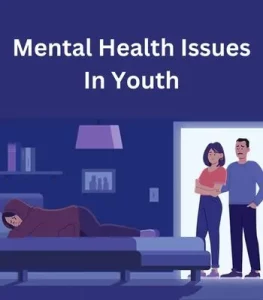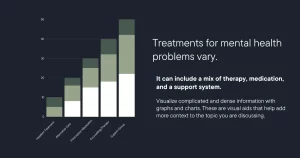Mental Health Issues In Youth
- Category How Mental Health Disorders Affect Youth
Table of Contents
ToggleMental Health Issues In Youth
Alarmingly, 75% of teenagers and young people who struggle with mental health issues don’t receive the support they require.
Young people’s physical and mental well-being is equally vital. They can grow into well-rounded, healthy individuals when they have good mental health, which helps them build the resilience to handle whatever life throws at them.
The following things can support children’s and adolescents’ mental health:
- having time and flexibility to play both indoors and outdoors, consuming a healthy diet, and engaging in regular exercise.
- being a part of a family that gets along well.
- attending a school that prioritizes the health of all of its students and participating in neighborhood activities.
Other elements, such as feeling loved, trusted, understood, and safe, are also crucial. Children who are resilient, upbeat, and who feel like they have some control over their lives and belong are more likely to be mentally well. The majority of children grow up with good mental health, but studies indicate that today’s youth are more likely than those from 30 years ago to experience mental health issues.
What factors could affect the mental health of kids and teenagers?
Children and young people who are already at risk for mental health issues can develop these issues as a result of traumatic situations.
Triggers can include changes like moving homes, switching schools, the arrival of a new sibling, etc. When kids start school, some are eager to meet new people and participate in new activities, while others could also feel uneasy.
Teenagers frequently go through emotional difficulty as their bodies and minds mature. Growing up requires working out and accepting who you are. The transition to maturity can be difficult for some young people, who may experiment with alcohol, drugs, or other substances that can harm their mental health.
Are some teenagers and young people more likely to suffer from mental health issues?
Some children and young people may be more susceptible to mental health issues than others due to specific risk factors. Even if a youngster experiences them, it does not necessarily follow that they would later have mental health issues.
- Having a persistent bodily condition.
- A parent who has experienced issues with their mental health, their use of alcohol, or the law.
- the loss of a close friend or family member.
- Parents who divorce or split.
- becoming a victim of severe bullying or being physically or sexually assaulted.
- Poverty or being homeless
- Being subjected to discrimination.
- Taking on adult responsibilities, looking after a relative.
- Having persistent issues at school.
Which mental health issues affect young people most frequently?
- Today, more children and young people than in previous decades experience depression. Depression is more common in teenagers than in early childhood.
- Self-harm is a major issue for young people. To cope with their severe emotional agony, some people harm themselves.
- Young people with a generalized anxiety disorder (GAD) may experience excessive worry. Separation anxiety may occur in very young children or those who are starting or changing schools.
- A disaster, being the victim of violent crime or severe bullying, experiencing physical or sexual abuse, seeing something horrifying or traumatizing, or surviving one can all lead to post-traumatic stress disorder (PTSD).
- Children who exhibit persistent hyperactivity, impulsivity, and trouble focusing may suffer from attention deficit hyperactivity disorder.
- Eating disorders typically begin in adolescence and are more prevalent in girls than in boys. Young persons who acquire eating disorders are uncommon. However, eating disorders like bulimia nervosa and anorexia nervosa can hurt a child’s physical development and health.
What resources are accessible to me as a young person?
There is assistance available if you are a young person and concerned about your mental health. The following activities might be worth trying.
Talk to a parent, friend, or other trusted adult about how you are feeling. Ideas for talking to a friend openly can be found on our friendship page.
see your doctor. They can respond to any inquiries you have about how you’re feeling, walk you through the various forms of support, and direct you to other programs that might be able to help you further.
Make contact with organizations and services that support people with mental health issues. For support that is tailored especially for young people, visit our getting help page or look under “organizations that can help” below.
What can I do if I’m scared about my young teenager?
One of the most crucial things parents or guardians can do is to listen to their kids and consider their sentiments. They might ask for a hug, for you to help them make a change, or for direct assistance.
Negative emotions in children and young adults typically pass. However, it’s a good idea to seek help if your child is distressed for an extended period if their feelings are interfering with family life, if they are preventing them from moving on with their lives, or if they are consistently acting in ways that are inappropriate for their age.
The majority of mental health care for kids and teens is free and offered by the NHS, your child’s school, or the social services division of your local council.
A teacher, school nurse, school counselor, or educational psychologist could be able to help if your child is having issues at school. If not, consult your doctor or a health visitor. Whenever necessary, they might suggest a youngster get more assistance. In the Child and Adolescent Mental Health Services, several experts frequently collaborate (CAMHS).
What forms of treatment could be given to young people?
Talking about the issue and determining the best course of action are frequent components of treatment for kids and teenagers. This could be accomplished through play for young children. To assist them in examining their emotions and actions, they might be sent to an expert, such as a qualified counselor.
The effectiveness of talking therapy for children and adolescents is well documented, but there are some situations where medication may be beneficial as well. Before giving children any medication, a specialist must evaluate the child.
Information on a child and their families will be kept private by the specialists who are supporting them. Young people can get assistance on their own by calling a hotline or going straight to a specialist. However, if they are under 16, they will typically require parental permission for medical care.
If young person doesn’t want to tell their family about their conversations with professionals, they have a right to privacy.
How Mental Health Disorders Affect Youth
Youth with mental health illnesses frequently struggle in a variety of contexts, such as their own families, their homes, their schools, and their communities.
Families
Youth with mental health illnesses frequently confront parents and siblings due to their conduct, and they are occasionally singled out and held responsible for family strife and disturbance. Families frequently experience tension because parents and other caregivers lack the skills necessary to care for their charges or themselves. The parent-child bond is strained, which could cause marital strife. The difficulties may have an impact on the family’s social network and relationships with family members, cutting the family off from potential sources of support. This pattern of challenging family interactions can occasionally result in social isolation.
School
Some young people with mental health conditions struggle in school. Most of the time, it isn’t because they don’t want to succeed. Instead, their disorders’ associated behaviors, thoughts, and emotions hinder their success. Even though the cause of the issue may be connected to their mental health, these same issues frequently result in disciplinary actions in schools.
Middle and Elementary Schools
Youth with mental health difficulties have a higher likelihood of experiencing school discontent, absences, suspension, or expulsion. Their lack of focus, distractibility, difficulty to retain information, poor peer connections, and aggressive behavior hurts their capacity to learn. They could also be reclusive and challenging to interact with.
Children and adolescents with mental health disorders may miss up to 18 to 22 days of school in any given school year.
Children and young people with mental disorders experience suspension and expulsion rates that are three times higher than those of their peers.
High School
Compared to their counterparts in the general population, high school students with mental health conditions are more likely to fail or drop out of school. Particularly those young people who may be considerably depressed as a result of being ostracized or alienated, frequently engage in high-risk behaviors including drug and alcohol usage and/or suicide attempts.
- While just 7% of all children with disabilities receive predominantly Ds and Fs, up to 14 percent of young people with mental health conditions do.
- Youth absenteeism and tardiness rates are significant when mental illness is untreated. Referrals to mental health services offered at schools or to therapy can help to cut down absenteeism and tardiness rates by 50 and 25 percent, respectively.
- When compared to other impairment categories, individuals with emotional disorders consistently have the lowest graduation rates and greatest dropout rates in the special education system. Between the ages of 14 and 21, 45 percent of students who received special education services under IDEA Part B for an emotional disturbance dropped out in 2005–2006.
- Only 32% of students who have a serious mental disorder complete their education after high school.

%20(2).jpg)










